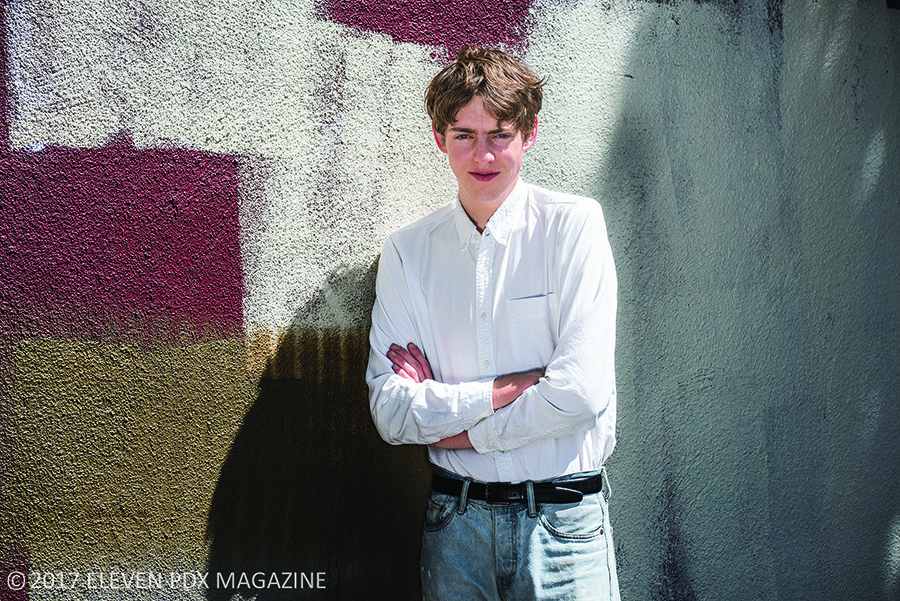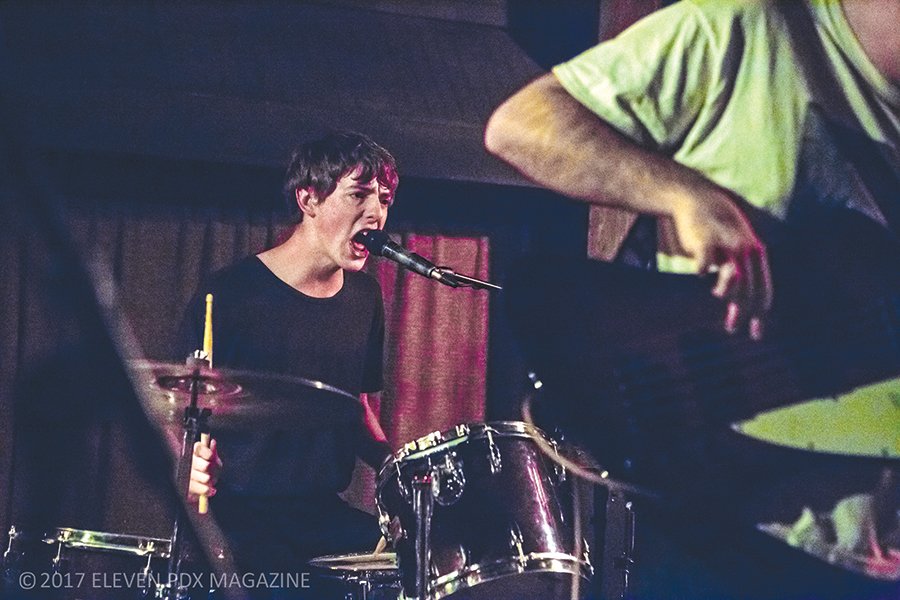Turtlenecked


For the past two years, twenty-one year old Lewis and Clark student Harrison Smith has been in his bedroom cranking out work at a staggering pace with a keen ear for hooks likely to elevate him to relevancy outside the Portland music scene. Smith’s sophomore release under the name Turtlenecked, Vulture, comes out June 16 on Good Cheer Records. On the record, Smith’s manic and aggressive vocals overlay spastic compositions indebted to the sonic minimalism and angularity of late 70’s post-punk. As with all his work, Vulture contains a smattering of micro-references to various genres, but this time it feels a little more like blending styles than hopping between them from song to song. He’s arrived at a sound that’s angry, playful, and a little bit tongue in cheek. When we talked on a dive-bar patio, Smith came off affable, even a little bit goofy. The vibe I get from him and his music is that he’s pretty serious about what he does but acknowledges that it’s a little silly to take much too seriously.
11: Tell me about your single “Boys Club.”
Harrison Smith: There isn’t really a conclusion with that song. It’s me just kind of rooting around in egotism, but then also thinking about being a white dude. Especially in Portland, there’s just a bunch of white bros in the rock music scene. There’s not a lot of diversity. Obviously I also love a bunch of white dude musicians, but, I don’t know… It’s kind of annoying?
11: So you’re calling yourself out?
HS: Yeah I’m kinda calling myself out, but at the same time, I’m going on this ego trip. It’s kind of hard to explain. There’s a lot of bands that come from the same background and upbringing telling the same sort of stories and there’s this egotistical part of me that wants to be the best, but I also realize the world doesn’t need more bros rocking out. I don’t know, I feel like the indie bro narrative is sort of inherently narcissistic, like, “Oh, I’m such an outcast and no one respects me! Now I’m going to be a musician so people will respect me.” It’s sort of like with movies where the protagonist is a loser. I imagine a lot of the time the directors think of themselves as that loser kid, but growing up they were probably just assholes. Hahaha!
But yeah, since I’m so similar to a lot of the people I’m around in the rock music scene, I guess it could be interpreted as a critique of them too, but that’s not really where I’m coming from. My music is self-centered, like all music really. Most musicians are telling stories about themselves and their own experiences. It’s kind of a narcissistic practice, but sometimes I feel like narcissism is necessary to make really good art. Kind of like Kanye. I may be delusional, but sometimes I think it’s true.
11: I don’t know why but that makes me think of that Ru Paul quote: “If you can’t love yourself, honey, how you gonna love somebody else?”
HS: Hahaha! Yeah, I agree with that, but it’s hard… You can’t just love yourself, you kinda have to hate yourself too. That’s why Kanye’s so good. He’s got all these songs where he’s like, “I’m a douche bag!” In a sense, good pop music provides a more exaggerated version of how everyone feels sometimes. You can get hyped listening to someone who’s super egotistical like Kanye and be like, “Yeah, I’m egotistical. I don’t give a fuck! I feel great!”
11: Your vocals are super expressive; I feel like they really help set the tone of your music. Are you more concerned with lyrical content or with the vocals as an instrument?
HS: I’m probably somewhere in the middle. I really like the band Preoccupations, and their vocals are mostly there for ambiance. They’re setting this very post-punk industrial dark foreboding medicated vibe. It works really well with the music. I don’t think I’d like Morrissey-esque lyrics over the top of that. On the other hand, sometimes if the lyrics are good I feel like I don’t even care about the music. Like with Leonard Cohen, his music is really beautiful because the composition is super minimal with the lyrics in the forefront.
11: Where do you draw inspiration from when you’re writing songs?
HS: Mostly from listening to other music. I get really excited about certain moments in songs that I think are totally audacious, like “Oh my God!” That stuff makes me want to replicate it or do something in the same fashion. There’s this quote from Degas where he’s like, “All I know is studying the great masters and replicating it.” I’m sure I’m butchering the quote, it’s probably better than that, but I think in some ways that’s true for me. I try to study lyrics and the music I like really analytically. It’s a totally impossible task to figure out what makes music good, but I do it all the time. I guess I usually try to strike a balance between being entertaining and experimental.
11: How have you developed since you first started Turtlenecked?
HS: I guess when I started I just wanted to make music that wasn’t pop-punk. I’m always afraid of getting labeled as pop-punk for some reason. When I put out my first full-length, Pure Plush Bone Cage, I wanted to combine baroque elements with post-punk music, so naturally I threw some MIDI harp and strings against some songs I was writing. The only concept other than that was that I wanted to record 11 songs that were all around two and a half minutes or less because I played this Joanna Newsom song for my Dad and he was like, “This shit sucks! It’s like 12 minutes long! All you need is two and a half minutes!” Then later I decided to throw in a 12th song that was like 10 minutes long.
11: So what changed with your approach to Vulture?
HS: My knowledge of production is way better now and my friend Garrett Linck, who’s awesome, helped me record it. I did get it professionally mastered, but we recorded and mixed it ourselves in my living room cause that shit’s expensive! Also, with Vulture I didn’t apply any time constraints and I wanted to make it a more ambitious project with less sonic restriction. I honestly think it’s a little too unrestricted. I feel like there’s still too much genre hopping. It’s hard for me because I like so many types of music. Like I really like Lithics and really appreciate how minimal and to the point their sound is. It’s just hard for me to do that because I’m like, “Oh! Now I wanna make a Joni Mitchell song, and now I wanna make a Death Grips song.”
11: Do you think that’s an issue or an asset?
HS: I don’t know. I like albums where the sound varies a lot like the Magnetic Fields’ 69 Love Songs. There are synth-pop songs and little folkie songs, but it’s still very unified in thematic content. So, it’s an asset in terms of bringing in different sounds, but sometimes I wish I had a more unified thing going on for cleanliness sake.
11: There’s a fair amount of aggression in some of your songs on Vulture.
HS: Yeah, I like aggressive music. I like music that’s exciting. I find a lot of music really boring. I wanted Vulture to be more personal, which means it isn’t always super fun. At the same time, I didn’t want it to be extremely confessional either. I always want to balance being fun with being intense. Like the song “Pangloss,” that started with the idea of putting a reggaeton beat into a post-punk song because I thought it would be funny, but the song’s about looking for a father figure. So there’s humor and sadness, but I think those things can coexist.

11: How do you go about writing as a solo artist?
HS: Well, I don’t really like jamming so I don’t sit around and play till something happens often. Usually, I conceptualize what I want to do before I even play the guitar. I usually go for something crazy like that reggaeton punk song, or the song “Tummy” that I wanted to sound like a minimal wave song. Most of the time my weird ideas end up sounding way more normal than I originally wanted because I fall back on the things that I’m most comfortable with, and the pop song sensibility comes flooding in.
11: So what’s next for Turtlenecked?
HS: I’m working on a new album now. I wrote like 30 songs after I recorded Vulture. I’ve cut like 15 of them and I’m going to cut more. They’re all finished but I haven’t recorded them yet. The lyrics are a little less insane and a little more conversational. There are a lot more hooks; I definitely wanted to write a bunch of bangers. I have a side project called DJ Venmo that started as a joke ripping on this Swedish rapper Yung Lean who deals in vaporwave and all this internet aesthetic shit. I just make beats for fun and rap over them. Some of that pop aesthetic has been snaking its way into the new Turtlenecked. A lot of people have a vendetta against pop music, but I have no problem with being poppy. I feel like I’d be totally fine if people were like, “He made this super great pop album and then he made a shitty ska album.”
11: HAHAH! Is that in the works?
HS: No! Hahahah! You’ll never catch me skanking. I just mean that, for me, the artform is the sum total of the album, it’s not just about good songs, and I feel fine playing with different aesthetics. That’s what’s great about artists like Kanye and Drake. Drake went from being a soft boy where he was all emotional and monopolized that realm and then he got all tough and was doing these hard minimal beats. I think you get interested in him as a person because you see his music change and you know he’s a real person and not just this one dimensional sound. »
Turtlenecked plays Mississippi Studios June 15 and are heading out on a month-long US tour with Good Cheer Records labelmates Cool American.




